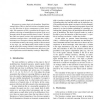170 search results - page 19 / 34 » atal 2004 |
116
Voted
ATAL
2004
Springer
15 years 5 months ago
2004
Springer
Combinatorial auctions, where agents can bid on bundles of items (resources, tasks, etc.), are desirable because the agents can express complementarity and substitutability among ...
ATAL
2004
Springer
15 years 5 months ago
2004
Springer
Most existing work in agent programming assumes an execution model where an agent has a knowledge base (KB) about the current state of the world, and makes decisions about what to ...
ATAL
2004
Springer
15 years 5 months ago
2004
Springer
We propose a context-logic style formalism, Timed Reasoning Logics (TRL), to describe resource-bounded reasoners who take time to derive consequences of their knowledge. The seman...
ATAL
2004
Springer
15 years 5 months ago
2004
Springer
The paper describes the architecture of Brown University’s agent, Botticelli, a finalist in the 2003 Trading Agent Competition in Supply Chain Management (TAC SCM). In TAC SCM,...
ATAL
2004
Springer
15 years 5 months ago
2004
Springer
We define trust-based mechanism design as an augmentation of traditional mechanism design in which agents take into account the degree of trust that they have in their counterpar...

